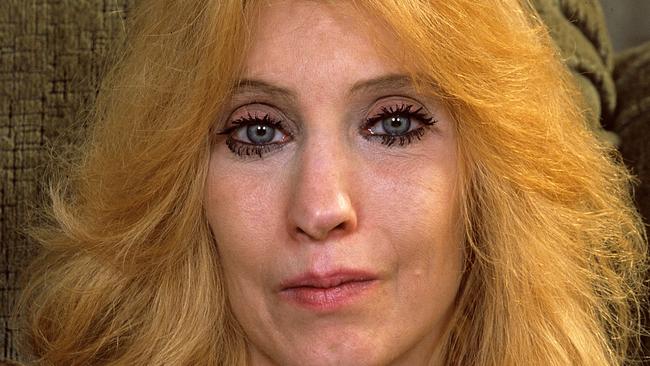
Deborah Rae Nelson
Author, mother of rapper Eminem. Born Kansas, January 6, 1955; died Missouri, December 2, aged 69.
John Lennon’s song Mother in 1970 was a stark rejection of his absent father: “Father, you left me/But I never left you/I needed you/You didn’t need me/So … goodbye.”
Bruce Mathers III – known as the rapper Eminem – expressed a similar emotion, but more crudely, in his song Cleanin’ Out My Closet in which he described the man who left the family home when the boy was 18 months: “My faggot father must’ve had his panties in a bunch/’Cause he split, I wonder if he even kissed me goodbye.”
It’s primitive. It’s coarse. That’s rapping.
And Eminem, who was raised by his mother, Deborah, was pulling no punches with her either: “Witnessin’ your mam poppin’ prescription pills in the kitchen/Bitchin’ that someone’s always goin through her purse and shit’s missin’.”
Deborah Nelson was born to a military family and claimed her childhood was chaotic well before her parents split when she was nine. She married Marshall Mathers Jr in 1970 when she was 15. Her son Marshall Mathers III was born two years later. His dad left early in 1974.
The family’s life was as hard as it had been for Nelson growing up. The uneducated single mother and her son moved about Missouri, where the boy had been born, and stayed in various houses, usually with relatives, before settling in a poor, largely black neighbourhood among the industrial decay of Detroit, Michigan. Nelson said young Marshall would write letters to his dad but that these were returned unopened.
Marshall was unhappy at school and once was seriously attacked by another boy. Nelson tried to sue the school, but the case was ruled inadmissable.
Her brother Ronnie bought Marshall an Ice-T rap record and the boy became fixated with the singer and his words, including the infamous Cop Killer song. The lyrics, like Mather’s when he started rapping, were a vulgar marriage of rhyming dictionary couplets and violent fantasy.
Marshall would skip school to sing with other children keen on the emerging Detroit rap scene. It is hard to know who is to blame for him having to sit year 9 three years straight, but his mother was the adult in the house.
As Eminem, he lazily portrayed his past as one of white trailer trash hopelessness. Nelson’s life was certainly one of poverty and of poor choices (among which were four husbands) but the thread of a mother’s love was strong. When teachers believed the boy who would not stop tapping pencils and rulers around his desk was autistic, she would defend him.
She told a reporter in 2008: “He’s very, very creative. You gotta give him credit. He’s borderline genius. He always was.” The respect was hardly reciprocated.
Deborah’s young brother Ronnie took his own life in 1991 and was buried in her town. One day she heard there were cars cruising around the cemetery. Concerned they might be vandals, she went there and confronted the people in the two SUVs. Behind the tinted windows of one was her son, but when she approached to speak to him the car drove off.
She wrote a book, My Son Marshall, My Son Eminem: Setting the Record Straight on My Life (ghostwritten by English journalist Annette Witheridge who famously would arrange the photos of Prince Andrew and his friend, notorious paedophile Jeffrey Epstein, in Central Park), which did not criticise her son despite his unpublishable attacks on her in his songs, but rather was a sad explanation of a family that had run off the rails.
She sued her son over the lyrics in Cleanin’ Out My Closet, but you get the feeling it was a cry for his attention. She settled for about $2000 more than her legal fees.
He did stop performing it and even sang an apology of sorts called Headlights, a qualified expression of regret at best that included the lines: “You’re kickin’ me out? It’s 15 degrees/ And it’s Christmas Eve, ‘Little prick, just leave’.”
Perhaps it was desperate Americans such as Nelson failing to live up to that nation’s dreams whom presidential candidate Hillary Clinton dismissed as irredeemable and labelled the “deplorables”.
But you wonder how a grandmother – Marshall has a daughter named Hailie – would have handled these lyrics from her son: “And Hailie’s getting’ so big now, you should see her, she beautiful/But you’ll never see her, she won’t even be at your funeral (Ha-ha!)”




OBITUARY